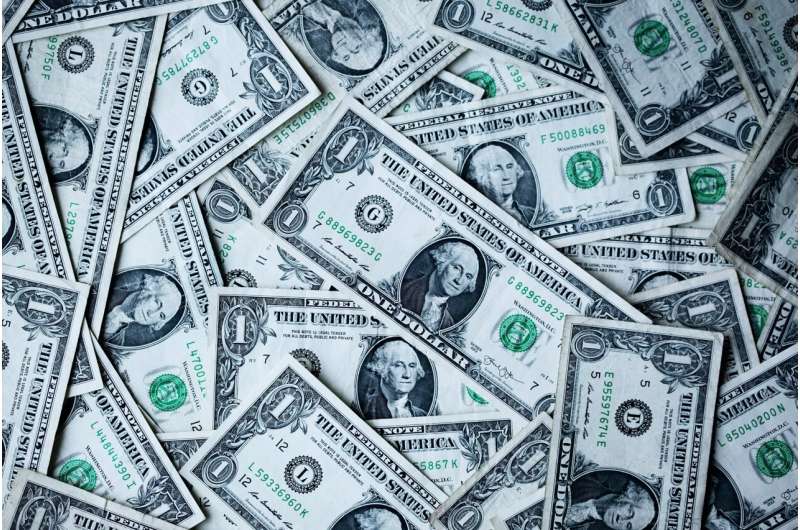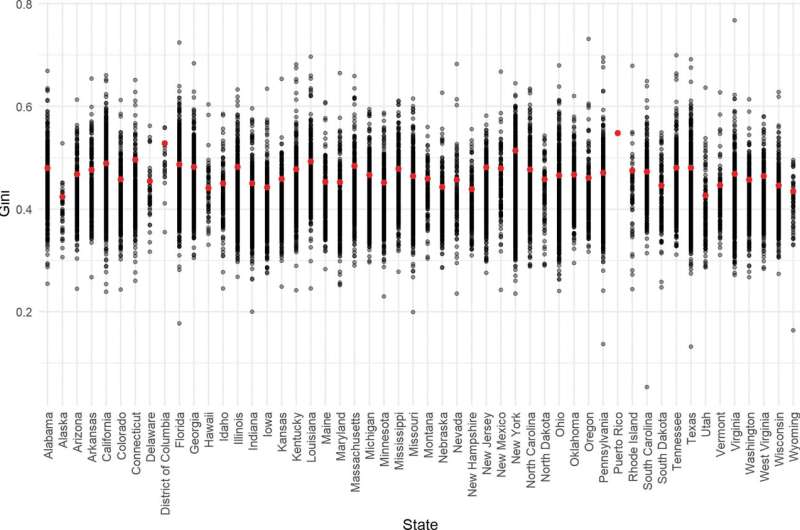This article has been reviewed according to Science X's editorial process and policies. Editors have highlighted the following attributes while ensuring the content's credibility:
fact-checked
peer-reviewed publication
trusted source
proofread
When local economic inequality is high, the rich tend to be more generous

Rich individuals living in communities with greater levels of economic inequality tend to be more generous with charitable giving and prosocial behaviors, according to a study published in PLoS ONE by Joel H. Suss from the London School of Economics & Political Science and Bank of England, UK.
Many studies have attempted to assess whether the rich are more or less generous than the poor, and whether this shifts depending on the starkness of economic inequality. Thus far, the results have been inconclusive. Previous work in this vein has been conducted at a macro level, using state, region, and country-level aggregated data. In this study, Suss examined whether more specific economic data at the local, neighborhood level might provide greater insight into the relationship between generosity and income.
Suss analyzed information on charitable donations in 2018 from the US Internal Revenue Service, as well as 2014-2018 data on income inequality from the American Community Survey, using zip code areas (mean population 14,041; standard deviation 15,846) as the most granular community unit. He also analyzed data on self-reported charitable giving and volunteering from the 2016-2018 UK survey "Understanding Society" (N= 39,289), comparing these with housing values to approximately measure neighborhood inequality.
In contrast to previous studies, Suss found local inequality increased the generosity of richer groups in both the UK and US when viewed with this more specific local lens. In the US analysis, more unequal areas also showed less generosity from the lowest-income groups.
In follow-up analyses aggregating his US data more broadly at the county and state levels, in line with the methods of previous research, Suss' results reversed, showing increased inequality reducing giving by all income groups relative to the lowest income group (incomes less than $10k)—and underscoring the importance of the chosen spatial unit.

These results show correlation of income and prosocial behavior in the context of economic inequality but cannot explain causation. Suss points to future analyses assessing whether this more granular approach generalizes to cultures beyond the US and UK. He also encourages further investigation into the seemingly contradictory result of macro-and micro-levels of inequality showing opposite effects on generosity and income, suggesting that this may be due to increased economic segregation across communities.
The authors add, "Inequality is experienced locally, within peoples' neighborhoods and communities. The implications of this for how people behave toward others has been largely overlooked in the academic literature, which most often considers inequality from a macro perspective. This paper examines the relationship between local inequality and charitable giving—an important form of pro-social behavior—in large US and UK samples."
"The results indicate that local inequality is associated with increased generosity among rich people in both places, which is contrary to findings at more aggregated geographical levels, pointing to contrasting implications of inequality at different spatial levels."
More information: Higher income individuals are more generous when local economic inequality is high, PLoS ONE (2023). DOI: 10.1371/journal.pone.0286273
Journal information: PLoS ONE
Provided by Public Library of Science





















